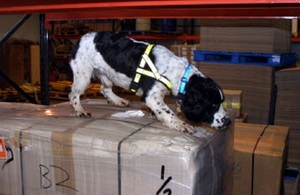Sussex service dogs charity hailed as key to veterans recovery
A service dogs charity in Sussex has been hailed as a leading light of support for veterans suffering from mental health issues.
Chancellor of the Duchy of Lancaster Steve Barclay, today met with veterans and their assistance dogs at Service Dogs UK in Petworth.
The charity recently received £35,000 from the government’s Afghanistan Veterans’ Fund, which provides funding for projects which support veterans of Afghanistan and their families.
As well as meeting with veterans and dog trainers, the minister saw demonstrations of how the dogs help veterans deal with mental health issues, such as PTSD.
The dogs are trained to do a variety of practical tasks, such as wake the veterans from nightmares, interrupt anxiety attacks, help with providing space by positioning, fetch medication and take the veteran to the nearest exit when overwhelmed.
The dogs also give veterans the confidence to go out and integrate with the community, the shared oxytocin relieves stress and lowers anxiety naturally.
Chancellor of the Duchy of Lancaster Steve Barclay said:
It was fantastic to meet with veterans and their assistance dogs at Service Dogs UK in Sussex.
This unique model of training the dogs with their owners has supported the mental health and wellbeing of many veterans who have been suffering from PTSD.
I’m determined to make the UK the best place in the world to be a veteran and that is why we are putting in place measures across health and employment services to ensure they get the support they deserve.
The Afghanistan Veterans’ Fund was announced by the Prime Minister last year, following the withdrawal from Afghanistan. The fund supports the Afghanistan veteran cohort with help adjusting to civilian life.
The funding to Service Dogs UK will allow them to increase capacity to their ‘Canines and Comradeship after Conflict’ projects, which has seen an increased demand following the Afghanistan withdrawal.
The programme has already helped over 30 Veterans become Assistance Dog teams.
During the visit the minister joined a training session to understand how veterans at all stages of training their service dogs have benefited from their experiences getting an assistance dog.
Garry Botterill, Operations Director at Service Dogs UK said:
We are delighted to host this visit by the Minister in recognition of the work we are doing to help our Veterans. The Armed Forces Covenant grants have been key to enabling us to support our wonderful Veterans and helping them to a brighter future.
In particular, the ‘Canines and Comradeship after Conflict’ award allows us to further our service to them which greatly enhances the social and Peer Support element of our charity. We are very grateful to receive such valuable support!
The minister also spoke to veterans whose dogs had recently qualified as assistance dogs. Service Dogs UK offers a model where veterans train their own service dogs, which can provide higher levels of personal satisfaction, pride and a real sense of achievement when they become accredited Assistance Dog Partnerships.
Lee Carter, a veteran who has successfully qualified through Service Dogs UK, said:
Service Dogs UK have been a life changer for me. From the very start they lived their values, providing a safe place to learn, an excellent team of people all focused on helping you succeed from taking those first few tentative steps, to training with professional dog trainers twice a week, having behaviourists and nutritionists input on looking after your dog, right through to becoming an accredited assistance dog partnership and beyond.
By sourcing their dogs primarily from rescue they really are changing two lives at a time.
